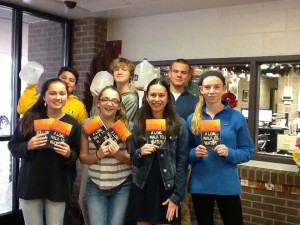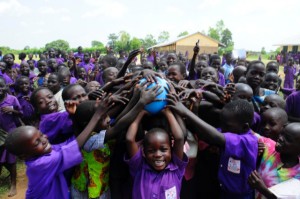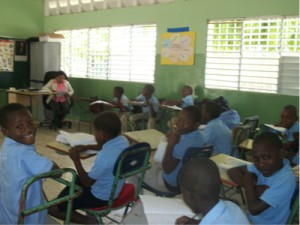Inspired by a book, students work to fund water projects in Uganda and Dominican Republic

Charles F. Patton eighth grade students display the book “A Long Walk to Water” which inspired them to help children in developing nations get clean water. A Walk For Water event this Saturday is being run by the students, who hope to raise $5,000 to help pay for projects in Uganda and the Dominican Republic.
EAST MARLBOROUGH — With today’s world of digital distractions, it can be hard to get an eighth grade student to pay much attention to anything beyond his or her handheld digital devices. But a group of Charles F. Patton Middle School students are looking far beyond their own world and community and raising money to build a well for a school in Uganda and a water filtration system for a school in the Dominican Republic.
The major fundraiser for both projects will be a Walk For Water, this Saturday at the school. Students will walk five kilometers — the average distance children in developing countries have to walk to get water — and will carry gallon jugs of water to raise awareness and show support for those students thousands of miles away.
Registration/check-in begins at 8:15 am on Saturday, with the walk beginning at 9 am. Donations can be made online via the organization website prior to the event, or even after the fact, and donors will receive an automated tax receipt. Participants can also make donations day of event, but those must be cash or check. Receipts will be provided.
Although the event is being organized and managed by Patton students, it is open to the community, and everyone is welcome to come walk and help support the project.
The event is timed to coincide with World Water Day, which is Sunday.

Students at the Agama Primary School in Uganda — where Patton Middle School students hope to raise funds to build a new well.
Patton is one of just 12 schools in Pennsylvania participating in the event — those individuals who would like to support the effort with a financial donation can click this link to learn more.
The students hope to raise a total of $5,000 to help pay for the building of a well at the Agama Primary School in Uganda and a hand washing station/water filtrations system the Escuela Primaria de Santa Maria in the Dominican Republic. Through a partnership with H2O for Life, the 8th graders at Patton Middle School are truly engaged global citizens.
The students’ interest in doing something for those in need of fresh, clean water was sparked in part by the book “A Long Walk to Water” by Linda Sue Park, said Patton Geography teacher Janice Lear.
“A number of students said, ‘It is not OK that kids around the world don’t have clean water,’ ” Lear said. “There was a palpable sense of urgency and commitment to raise awareness within our community about the global water crisis, and to raise money to fund the building of a well.”
Lear said that the school’s geography faculty had been looking for ways to incorporate service into the curriculum, and Walk For Water proved a good fit, Lear said.
“We had certain criteria: it had to be student-centered, authentic, tied to our curriculum, and a meaningful experience for our students,” she said.

Patton students are raising funds to help build a hand washing station/water filtrations system the Escuela Primaria de Santa Maria in the Dominican Republic, with Saturday’s Walk For Water.
Lear said she attended the National Council of Social Studies Conference, and participated in a workshop on service learning, that was hosted by the organization H2O for Life Schools, which turned out to offer the perfect project for Patton’s students.
“It was serendipitous because I had just finished reading A Long Walk to Water to my students, and we were just finishing our unit on Natural Resources,” Lear said. “When I brought the idea back to my students, they did not hesitate. They embraced this challenge with fierce determination and great energy.
“I have been so impressed with the eighth grade students’ compassion and spirit,” she said. “They decided it was not OK that children were dying because of a lack of water, and were driven to action.”
As they learned of other students like themselves, the students became even more passionate about the project.
“I had a general idea of what the global crisis looked like, but when we saw videos in class of what the lack of water actually looks like, I had a new appreciation for this issue,” eighth grade student Tommy Kelly said. “For millions of children worldwide, the absolute lack of clean water is the norm. It is all they know. If that happened here in our country, there would be an outrage. When I realized that by joining this team to build just one well, we could literally change the lives of children in a village in Uganda, I felt compelled to help. I realized that by starting small, we could make a big impact and change the world.”
Learning what every day life can be like for children in less developed countries proved to be a real eye-opener.
“Ms. Lear read A Long Walk to Water to us, and even though it was a fictional story, it was based on the experiences of children in Africa,” said eighth grader Liz Stewart. “I also couldn’t believe the images I saw of children playing in dirty water, and retrieving their toys from open sewage. That was my call to action. I have in the past worked to raise money for Crohn’s Disease, and I have a lot of success in that effort. So, I had confidence I could translate my fundraising experience from that to make a real impact on our Water project in school.”
The vivid accounts in the book, really made the global water crisis come alive for the students.
The book “A Long Walk to Water,” really resonated with me,” eighth grader Bailey Santaguida said. “I was able to see how the main character, Salva, was able to change the lives of villagers by providing them with a simple well. This is not a complex issue- it is an easy fix. Just one well, which costs only a few thousand dollars, and does not require too much labor investment, can completely change the lives of hundreds of children. The absence of water essentially paralyzes a community and prevents them from developing. By building a well, we can change the lives of the children in Uganda. Kids will be able to attend school, and not spend hours fetching water. The community will now be able to provide clean water, which is critical for improved medical care and economic development.”






